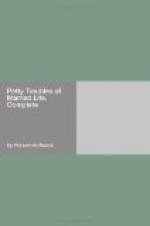“Monsieur de Fischtaminel, mother, opens the door of my chamber, or of the room to which I have flown for refuge, five or six times an hour, and comes up to me in an excited way, and says, ’Well, what are you doing, my belle?’ (the expression in fashion during the Empire) without perceiving that he is constantly repeating the same phrase, which is to me like the one pint too much that the executioner formerly poured into the torture by water.
“Then there’s another bore! We can’t go to walk any more. A promenade without conversation, without interest, is impossible. My husband walks with me for the walk, as if he were alone. I have the fatigue without the pleasure.
“The interval between getting up and breakfast is employed in my toilet, in my household duties; and I manage to get through with this part of the day. But between breakfast and dinner, there is a whole desert to plough, a waste to traverse. My husband’s want of occupation does not leave me a moment of repose, he overpowers me by his uselessness; his idle life positively wears me out. His two eyes always open and gazing at mine compel me to keep them lowered. Then his monotonous remarks:
“’What o’clock is it, love? What are you doing now? What are you thinking of? What do you mean to do? Where shall we go this evening? Anything new? What weather! I don’t feel well, etc., etc.’
“All these variations upon the same theme—the interrogation point —which compose Fischtaminel’s repertory, will drive me mad. Add to these leaden arrows everlastingly shot off at me, one last trait which will complete the description of my happiness, and you will understand my life.
“Monsieur de Fischtaminel, who went away in 1809, with the rank of sub-lieutenant, at the age of eighteen, has had no other education than that due to discipline, to the natural sense of honor of a noble and a soldier: but though he possesses tact, the sentiment of probity, and a proper subordination, his ignorance is gross, he knows absolutely nothing, and he has a horror of learning anything. Oh, dear mother, what an accomplished door-keeper this colonel would have made, had he been born in indigence! I don’t think a bit the better of him for his bravery, for he did not fight against the Russians, the Austrians, or the Prussians: he fought against ennui. When he rushed upon the enemy, Captain Fischtaminel’s purpose was to get away from himself. He married because he had nothing else to do.
“We have another slight difficulty to content with: my husband harasses the servants to such a degree that we change them every six months.
“I so ardently desire, dear mother, to remain a virtuous woman, that I am going to try the effect of traveling for half the year. During the winter, I shall go every evening to the Italian or the French opera, or to parties: but I don’t know whether our fortune will permit such an expenditure. Uncle Cyrus ought to come to Paris—I would take care of him as I would of an inheritance.




